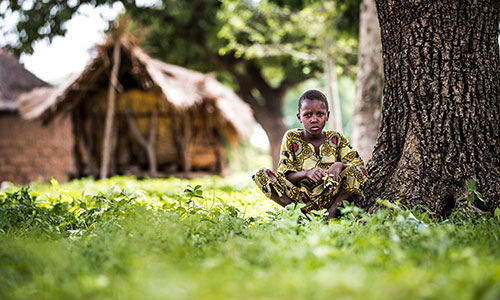6 Causes of Poverty
Poverty is a complex problem with many different causes. Let’s discuss some of the most common causes of poverty, from conflict to poor infrastructure.
1. War & Conflict
Conflicts such as war and gang violence often force families to flee their homes or destroy them altogether. Children in these situations may suddenly lose their shelter, access to food and in some cases, their caregivers.
Conflict also destroys infrastructure such as hospitals, schools and roads, leaving entire communities without vital services like medical care and education. Without their needs met, children and the communities they live in struggle to get back on their feet, keeping them in poverty.
2. Natural Disasters
According to the World Bank, natural disasters force 26 million people into poverty every year. For example, natural disasters like earthquakes and hurricanes destroy homes and communities, leaving many children and families with nothing but the clothes on their backs.
Floods or droughts destroy critical crops that families depend on for their income and nutrition. Even if families have some savings to turn to, it’s often far from enough to cover their needs after losing everything.
But those who already live in poverty before disaster? They don’t have any buffer or savings to turn to, leaving them without access to shelter, food, clean water and other necessities.
3. Lack of Nutrition
Poverty causes hunger. However, hunger also perpetuates poverty. For example, hunger can diminish a child’s immunity to disease and illness, keeping them sick and unable to attend school.
Without an education, children can’t learn the skills they need to provide for themselves or their families as adults. This often means they must raise their own children hungry and malnourished, perpetuating poverty for the next generation.
4. Lack of Clean Water
One in three people globally lacks access to clean drinking water. And for many families, finding water is an all-day task.
Children and families often must travel to find water and bring it back to their homes. For adults, this is time spent away from work. And for kids, this is time they could spend learning and growing. And if the water they gather is contaminated, sickness will keep them from work and school as well.
5. Limited Access to Medical Care
Many impoverished children can’t get quality medical care (if medical services are available in their community at all). In fact, about 4.5 billion people are not able to access essential health services.
Without access to basic medical care, children suffer from preventable illnesses. Like hunger, this keeps children from going to school, leaving them without the skills needed to achieve brighter futures.
To get even basic medical care, families must often drain what little resources they do have. This leaves them unable to afford food, rent and other necessities, pushing them further into poverty.
6. Poor Infrastructure
 Many impoverished communities lack basic systems that many of us take for granted, such as roads and water supplies. And this poor infrastructure worsens the causes of poverty listed above, amplifying their effects.
Many impoverished communities lack basic systems that many of us take for granted, such as roads and water supplies. And this poor infrastructure worsens the causes of poverty listed above, amplifying their effects.
For example, without roads, it’s hard to travel for medical care, food or work. And without water supply systems, many people are left drinking dangerously contaminated water that can sicken or even kill them.
Why Is Poverty a Problem?
Poverty impacts every aspect of a child’s life, preventing them from becoming who God created them to be.
- Poverty causes debilitating hunger and thirst.
- Poverty hinders healthy physical growth and development.
- Poverty increases infant and child mortality rates.
- Poverty increases stress and can bring about life-altering trauma.
- Poverty causes children to suffer from preventable illnesses and diseases.
- Poverty prevents children from getting an education, keeping them from reaching their full potential.
All of these damaging impacts of poverty make children feel valueless and hopeless.
They prevent children from seeing a brighter future beyond their circumstances. And without hope, the cycle of poverty continues throughout each generation.
How Compassion Helps Children Living in Poverty
We believe that all children should experience the fullness of life Jesus promised them (John 10:10). But for millions of children, poverty stands in the way.
At Compassion, we work to share the gospel in word and action to release children from poverty in Jesus’ name.
What does this mean? First, we share the good news of the gospel with every child in our program, giving them eternal hope. We then live out the gospel by taking action to meet their tangible right-now and long-term needs.
For example, all children receive access to medical checkups, malnutrition monitoring and education to ensure they have the necessities they need to grow. We also step in to provide disaster relief for children facing crises and prioritize child protection to keep children safe from violence and exploitation.
With their needs met, children go from surviving to thriving, empowered to journey out of poverty. We’ve seen the impact of our program time and time again. In fact, a recent study shows that out of the Compassion sponsorship graduates surveyed, 97% were released from poverty!